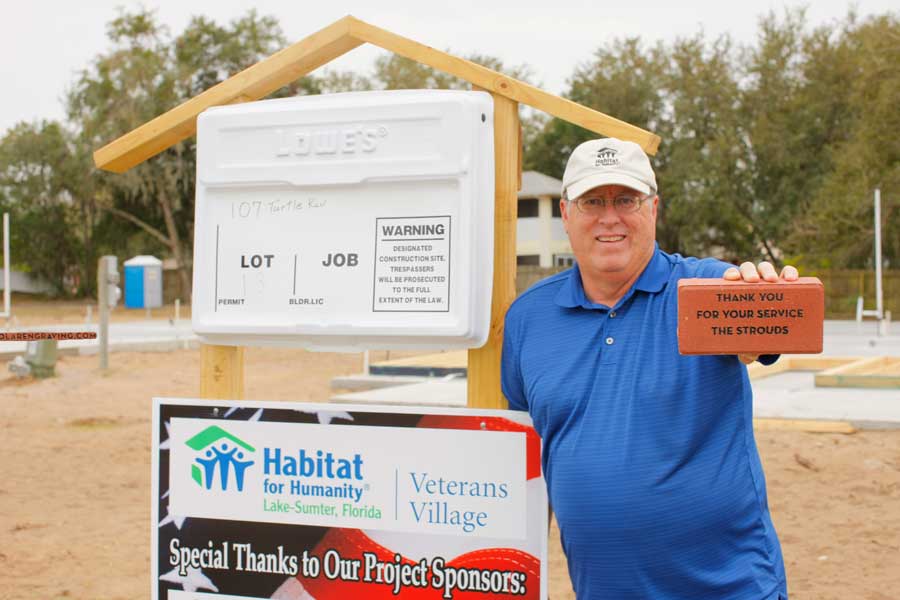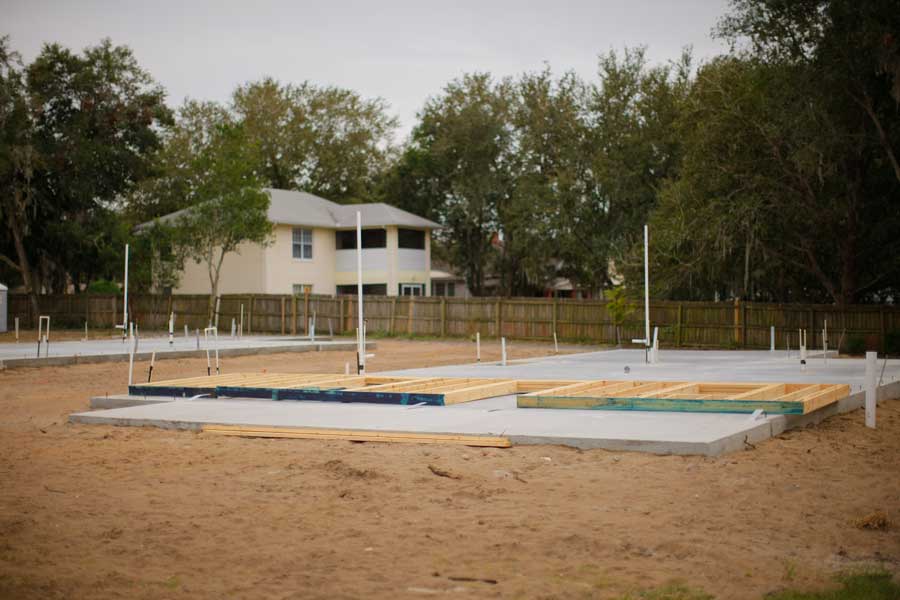Charity begins at home
Habitat for Humanity of Lake Sumter has helped families in need of safe and decent housing achieve the American dream since 1989, and now the organization is in the early stages of building Veterans Village and is looking into the future. Constructing a community of micro homes—affordable housing for seniors and millennials—just may be on the horizon.
Lee Owen, chair of the local Habitat, believes Habitat is headed in the right direction, and she praises the group’s CEO Kent Adcock for his vision.
“Kent really thinks out of the box and I love that,” says Lee. “It stretches us and it kind of makes us say ‘Why do we have to do things the same old way? Why can’t we do something different, based on the needs of the community?’ This makes it fun.”
The immediate fun task at hand is developing a $2.3 million Veterans Village on Lake Enola in Umatilla, billed as a cutting-edge project. Groundbreaking last month paved the way for hundreds of volunteers to build 12 affordable homes on the site, including college groups and Massachusetts Maritime Academy cadets, who are expected to come this winter and and spring of 2017. Work on the first two homes has begun, two more houses will be started in January, and construction on four more is slated for May.
“We’ll have eight by this time next year,” says Kent, before the final four homes are built. “I am really optimistic because there is not anything like it for veterans.”
The cottage-style homes are for all ages of veterans with a DD214 to purchase, including active military members and spouses of deceased veterans.
Kent believes many veterans will qualify for a VA loan with no money down or closing costs, or they may be able to get funding through the U.S. Department of Agriculture.
There are sponsorship opportunities for the community to help Veterans Village, including being a $100 brick sponsor to commemorate a loved one, thank a veteran, or add a company logo to an engraved brick. The bricks will complete the Veterans Path of the village of homes.
“Our whole focus is centered on veterans,” Kent says, “but what we are looking at is what I consider four vulnerable populations: veterans, elderly, disabled, and the millennials, who are having a very difficult time finding housing.”
The next big project
“I’m working on a new concept called micro houses,” says Kent, who plans to reveal more details about it to his Habitat board in January. “They’re not tiny houses and they’re not regular houses, but they fall within about 550- to 850-square-feet and they are perfect for a single individual or a couple, so the millennials would love it and the seniors would fit well from an affordability perspective.”
However, he notes most municipalities don’t allow anything below 750 square feet.
“So it’s an issue to where we will have to go to the municipality to see if we can get a variance or something or do like we are with Veterans Village and put it into a village that is designed for those,” Kent says.
He showed the design of a 540-square-foot micro house with a porch. The bedroom wall featured a Murphy bed that folds up and is put down for sleeping, which he believes young adults would like.
He says the micro houses would be very high quality, built on slabs, be efficient in energy and construction, and be a village of planned unit development (PUD) that is intergenerational with millennials, seniors, disabled, and veterans—mostly for single residents.
“It’s not a place for seniors, it’s not a place for veterans, it’s not a place for millennials, it’s an intergenerational walkable community,” Kent says. “I am really looking for the next possibility and I think it offers an opportunity—it’s about providing economically affordable high quality housing.”
He believes micro houses could fill a vital need.
“When you look at what rates are running now for rent, it’s astronomical,” Kent says. “It’s about listening, finding what the needs are, and filling the gaps rather than the other way around of trying to do something and make it fit.”
As a visionary, Kent says he makes efforts to listen to people to hear their needs.
“I was talking with some millennials and they were saying, ‘I can’t find a place and my rent is outrageously expensive,’” Kent says. “And it’s the same with seniors.”
And in looking into the future, he believes more housing will be smaller, more energy efficient, and more economical to operate.
Continuing with popular projects
Habitat continues to build new homes and had closings in November on houses in Eustis and Lady Lake, and the organization’s volunteers do preservation and repair jobs on houses throughout Lake and Sumter County.
Much of the rehab work is done on homes that Habitat was able to obtain out of foreclosure.
“We basically go in and replace anything and everything that needs replaced with a fresh everything in there and then we sell it to a Habitat family. We’ve been doing that for a while and we haven’t advertised it that much,” Kent says. “Back in 2008, when foreclosures were really big, that was all we did.”
Habitat for Humanity of Lake Sumter continues with new construction projects, rehab work on existing foreclosures, preservation repair, work on Veterans Village, and looks to the future of micro houses.
Another issue Kent believes worth evaluating is housing concerns among seniors.
“We are finding there are a lot of elderly women who have lost their husbands who are living in a home and are having major problems maintaining that home,” he says. “Maybe they need a new roof that needs replaced. We are hearing from so many ‘my insurance has contacted me and said they are going to drop me if I don’t do this, and I don’t have the money to replace my roof that is $10,000.’ ”
Kent believes Habitat can help a person get into a micro house for less than $410 a month, less than the cost of lot rent.
The way Kent sees it, developing a micro house community could be his last ‘hurrah’ before he retires.
“We’ve got two years to finish up the Veterans Village and I’ve got three more years before I think I am going to be getting close to retire,” he says. “If we can go on the heels of Veterans Village with a different community like we are talking about, that could be my exit piece. It may take longer than three years and that’s OK. It means I have to work a couple more years and that is not a big deal. Working until 70 is not going to hurt me.”
To become a sponsor or learn more about Veterans Village and other Habitat projects, call 352.483.0434.




[…] Read the full article here! […]